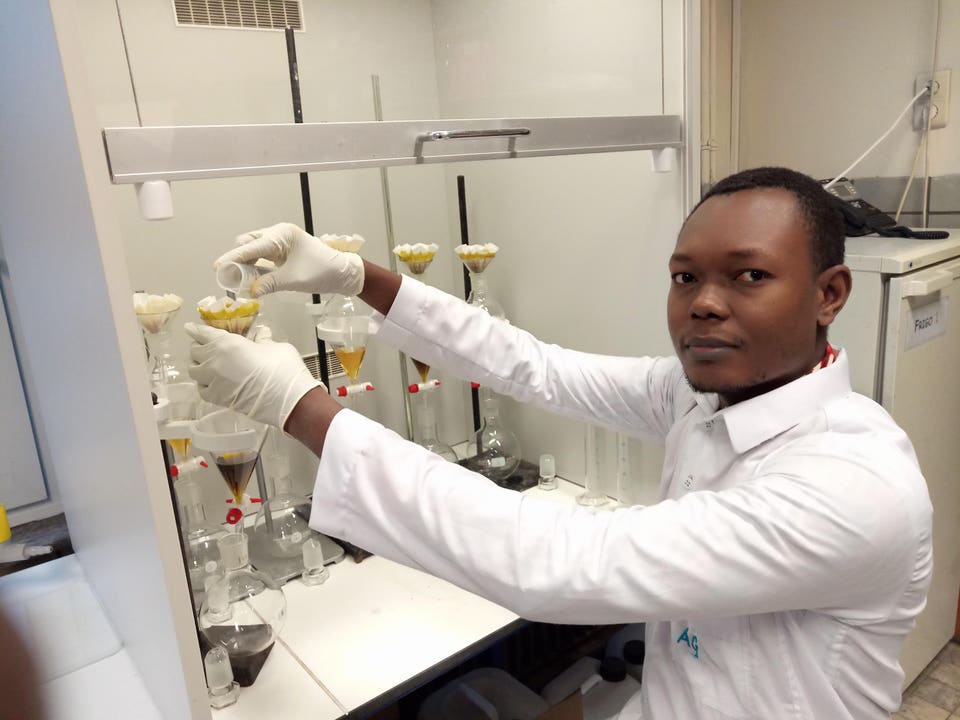Beninese researcher Armel Gougbedji A researcher in the west African country of Benin is working on how to make a better insect-based fish feed, aiming to replace more costly, less sustainable fish-meal. The global aquaculture market was valued at , but annually, 75% of the 20 million tonnes of raw material used to produce fish-meal come from whole fish according to a 2019 report from the . , executive director of the Benin-based NGO , explains that his team is working on optimizing the production of black soldier fly ( ) larvae, as an alternative protein source in fish feeds, in order to promote fish farming in Benin and make it more viable.
“Fishmeal is obtained through costly industrial processes and the massive fishing of small fish species, which is gradually threatening fish stocks and the ecological balance of the oceans,” he says, adding that insects (which are already a natural part of fish diets) are a valid and less costly alternative. “They can be easily produced, in a small space, from low-cost agricultural by-products, and use little water,” Gougbedji says, “What’s more, the emission of greenhouse gases during their rearing is quite low compared with conventional animal breeding. ” His work was recently recognized as the winner of one of eight Seed Grant winners of the , receiving $25,000 in grant funding from the Institute of Food Technologists and Seeding The Future Foundation.
“This research has the dual benefit of reducing human pressure on aquatic resources and cutting the cost of fish feed, which accounts for almost 70% of total production costs in fish farming. ” Gougbedji says, “Drawing on my extensive expertise, I have helped develop innovative insect farming methods and formulate feeds for fish farming, with the aim of optimizing yields while minimizing environmental impact, in order to meet the growing challenges of global food security. ” Insect-based Fish Farming Diagram, From Benin to Belgium And Back Gougbedji grew up in Cotonou, the biggest city of the small west Africa country of Benin.
“I didn’t particularly have a “Eureka” moment as a child, however, I have always been fascinated by the animal kingdom in general and aquatic species in particular, and this has greatly shaped my subsequent academic choices and career as a scientist,” he says. Gougbedji would go on to do a PhD in agricultural sciences and bio-engineering from Gembloux Agro-Bio Tech (Belgium), where he specialized in aquaculture and entomophagy (the human practice of eating insects). “As a PhD student, my main project studied the food component of a research project on the optimization of the tilapia production chain in Benin,” he says, “This project leads me to discover the world of insects at Gembloux Agro-Bio Tech’s Functional Entomology Unit.
” According to Gougbedji, involving scientists from the Global South in research is crucial to ensuring contextualized and relevant solutions. “This participation strengthens scientific autonomy and contributes to local capacity building, fostering more equitable international collaboration,” he says, “In short, the inclusion of scientists from the South is essential for global, equitable and sustainable solutions. ” Lake Nokoué is a lake in the southern part of Benin.
The city of Cotonou sits on the southern Fish For Good On the other side of the continent, , volunteer coordinator at Ecofinder Kenya and freshwater director at Conservation International is working to improve life in local communities by conserving collapsing fishing stocks on Lake Victoria. Recent decades have seen the emergence of Jaboya culture where women, who make up 90% of fish traders, engage in transactional sex as one of the strategies to get access to the catch from fishermen. Akwany says that the restoration of fisheries resources is not only critical in terms of freshwater biodiversity, food security and secure livelihoods; but critical in empowering women and reducing the pressures that lead to Jaboya culture.
“Less fish means more gender-based violence as manifested through sex-for-fish or Jaboya culture,” he says, adding that’s one reason why local women are strong force and supporters of fisheries conservation work. Akwany’s new project will be implemented in the Winam Gulf area covering Kisumu, Siaya – the hometown of Barack Obama’s father – and Busia Counties in western Kenya and will target three Critically Endangered native fish species: Ngege, Mbiru and Ningu. .
From: forbes
URL: https://www.forbes.com/sites/andrewwight/2023/12/18/could-bugs-be-a-cheaper-greener-way-to-feed-fish-in-benin/



